2014届最新高考英语一轮单元复习 精品阅读理解提升文章精选一百篇(57)
最新高考英语一轮单元复习 精品阅读理解提升文章精选一百篇(14)
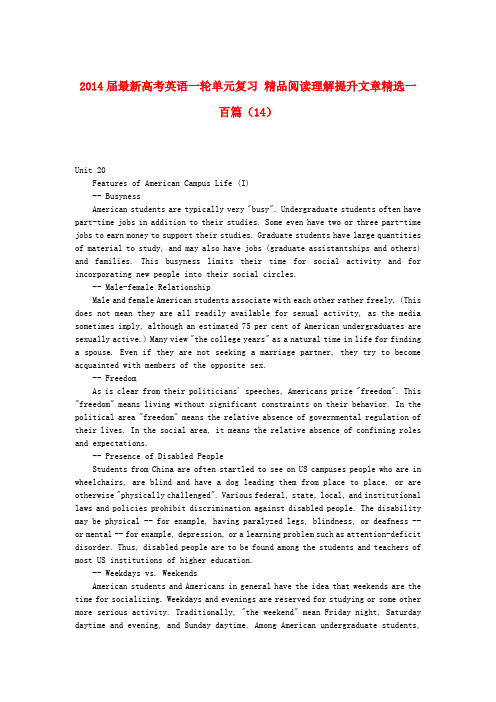
2014届最新高考英语一轮单元复习精品阅读理解提升文章精选一百篇(14)Unit 20Features of American Campus Life (I)-- BusynessAmerican students are typically very "busy". Undergraduate students often have part-time jobs in addition to their studies. Some even have two or three part-time jobs to earn money to support their studies. Graduate students have large quantities of material to study, and may also have jobs (graduate assistantships and others) and families. This busyness limits their time for social activity and for incorporating new people into their social circles.-- Male-female RelationshipMale and female American students associate with each other rather freely. (This does not mean they are all readily available for sexual activity, as the media sometimes imply, although an estimated 75 per cent of American undergraduates are sexually active.) Many view "the college years" as a natural time in life for finding a spouse. Even if they are not seeking a marriage partner, they try to become acquainted with members of the opposite sex.-- FreedomAs is clear from their politicians' speeches, Americans prize "freedom". This "freedom" means living without significant constraints on their behavior. In the political area "freedom" means the relative absence of governmental regulation of their lives. In the social area, it means the relative absence of confining roles and expectations.-- Presence of Disabled PeopleStudents from China are often startled to see on US campuses people who are in wheelchairs, are blind and have a dog leading them from place to place, or are otherwise "physically challenged". Various federal, state, local, and institutional laws and policies prohibit discrimination against disabled people. The disability may be physical -- for example, having paralyzed legs, blindness, or deafness -- or mental -- for example, depression, or a learning problem such as attention-deficit disorder. Thus, disabled people are to be found among the students and teachers of most US institutions of higher education.-- Weekdays vs. WeekendsAmerican students and Americans in general have the idea that weekends are the time for socializing. Weekdays and evenings are reserved for studying or some other more serious activity. Traditionally, "the weekend" mean Friday night, Saturday daytime and evening, and Sunday daytime. Among American undergraduate students,though, "weekend" may now include Thursday night (and sometimes even Wednesday night as well). So they might go "out" for three consecutive nights -- Thursday, Friday, and Saturday. Graduate students in general have more responsibilities and presumably more maturity, so their socializing is more likely to be limited to Friday nights and Saturdays.。
2014届最新高考英语一轮单元复习 精品阅读理解提升文章精选一百篇(99)
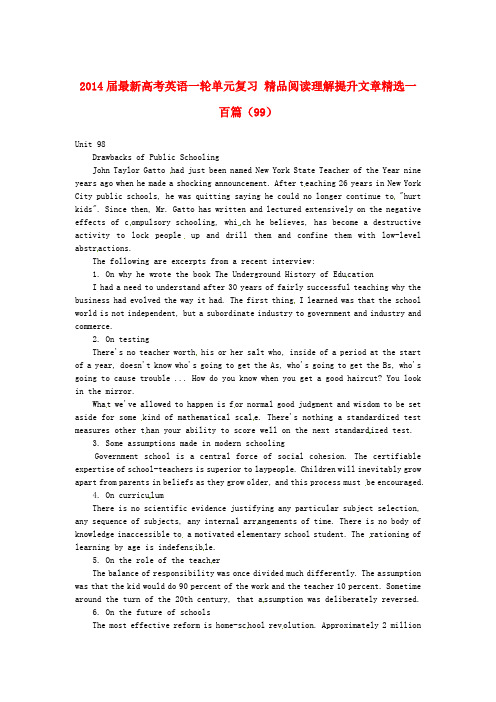
2014届最新高考英语一轮单元复习精品阅读理解提升文章精选一百篇(99)Unit 98Drawbacks of Public SchoolingJohn Taylor Gatto had just been named New York State Teacher of the Year nine years ago when he made a shocking announcement. After t eaching 26 years in New York City public schools, he was quitting saying he could no longer continue to "hurt kids". Since then, Mr. Gatto has written and lectured extensively on the negative effects of c ompulsory schooling, whi ch he believes, has become a destructive activity to lock people up and drill them and confine them with low-level abstr actions.The following are excerpts from a recent interview:1. On why he wrote the book The Underground History of Edu cationI had a need to understand after 30 years of fairly successful teaching why the business had evolved the way it had. The first thing I learned was that the school world is not independent, but a subordinate industry to government and industry and commerce.2. On testingThere's no teacher worth his or her salt who, inside of a period at the start of a year, doesn't know who's going to get the As, who's going to get the Bs, who's going to cause trouble ... How do you know when you get a good haircut? You look in the mirror.Wha t we've allowed to happen is f or normal good judgment and wisdom to be set aside for some kind of mathematical scal e. There's nothing a standardized test measures other t han your ability to score well on the next standard ized test.3. Some assumptions made in modern schoolingGovernment school is a central force of social cohesion. The certifiable expertise of school-teachers is superior to laypeople. Children will inevitably grow apart from parents in beliefs as they grow older, and this process must be encouraged.4. On curricu lumThere is no scientific evidence justifying any particular subject selection, any sequence of subjects, any internal arr angements of time. There is no body of knowledge inaccessible to a motivated elementary school student. The rationing of learning by age is indefens ib le.5. On the role of the teach erThe balance of responsibility was once divided much differently. The assumption was that the kid would do 90 percent of the work and the teacher 10 percent. Sometime around the turn of the 20th century, that a ssumption was deliberately reversed.6. On the future of schoolsThe most effective reform is home-sc hool rev olution. Approximately 2 millionpeople from all soci al classes and cultural backgrounds, in effect, s et up private labs of education.。
高中英语真题-2014届最新高考英语一轮单元复习精品阅读理解提升文章精选一百篇(70)_3
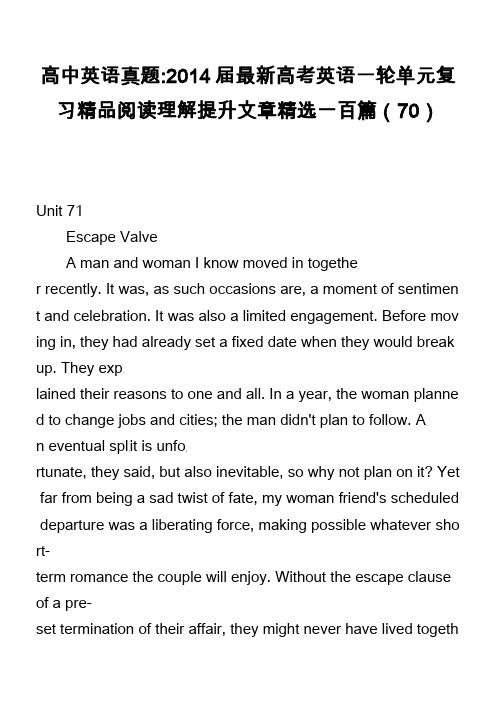
高中英语真题:2014届最新高考英语一轮单元复习精品阅读理解提升文章精选一百篇(70)Unit 71Escape ValveA man and woman I know moved in together recently. It was, as such occasions are, a moment of sentimen t and celebration. It was also a limited engagement. Before mov ing in, they had already set a fixed date when they would break up. They explained their reasons to one and all. In a year, the woman planne d to change jobs and cities; the man didn't plan to follow. An eventual split is unfortunate, they said, but also inevitable, so why not plan on it? Yet far from being a sad twist of fate, my woman friend's scheduled departure was a liberating force, making possible whatever sho rt-term romance the couple will enjoy. Without the escape clause of a pre-set termination of their affair, they might never have lived together.This situation is not unique. More and more people are ordering their lives along a principle I call the "automatic-out". In love, friendship, work, and the community, people increasingly prefer arrangements that autom atically end at some pre-set date. It is a force in society as a whole, as more of us hunger for lives that appear stable and deep-rooted but lack the complications of commitment.Automatic-out may have its foundations in the preset cycles of academic lif e. In recent decades, an ever-higher percentage of the population has been able to attend college and p ost-graduate schools. That's a good thing for the cause of education but perhaps not so good for society's spirit. L ongtime students learn to view institutions as places where people briefly come to rest, and from w hich they will be automatically removed on a date known years i n advance. They also tend to see institutions as a means by wh ich to take things for themselves, instead of adding things for ot hers.So it may be no surprise that professionals -- usually the beneficiaries of advanced schooling -- seem increasingly uninterested in staying put.A Brookings Institution study shows that Government-agency managers turn over, on average, every 21 months. Now it is becoming true of private enterprisesas well. According to the Conference Board, a business researc h organization,top corporate executives now switch jobs every 4.5 years on a verage.The job-switching mania, it is sometimes suggested, stems from acombination of boredom and expectations of promotion. But I think it is motivated b the desire f or automatic-out. When you know in advance that you will soon be changing jobs, you are relieved of concern for the overall integrity of your institution whether thequality of its products, the fairness of its service, the odds of its survival. You have a built-in excuse for selfishness ("I'll be leaving in a year anyway") and can concentrate on advancing yourself, secure in the knowledge that if you fail to improve your organization, you personally won't suffer. You'll be one step ahead of the crumbling wall. It seems to be the s ame in love. If a romance operates under some per-set restriction, neither partner feels obliged to sacrifice his inter ests for joint interests. Why sacrifice for something not expecte d to last long anyway? Thus, the shot-term benefits ofmarriage and living together (companionship, warmth, conveni ence) remain popular. But long-term obligation to the institution of marriage has fallen into disre pute among many young people. Children and family life are es pecially in disrepute today, for whenever children are present th ere is no easy way out, emotionally and legally. The weekend r omance is especially desirable today, not because people mov e around more now but because distance guaranteesan automatic-out.2014届最新高考英语一轮单元复习精品阅读理解提升文章精选一百篇(70)Unit 71Escape ValveA man and woman I know moved in together recently. It was, as such occasions are, a moment of sentiment and celebration. It was also a li mited engagement. Before moving in, they had already set a fixed date when they would break up. They explained their reasons to one and all. In a year, the woman planned to change jobs and cities; theman didn't plan to follow. An eventual split is unfortunate, they said, but also inevitable, so why not plan on it? Yet far from being a sad twist of fat e, my woman friend's scheduled departure was a liberating force, making possible whatever sh ort-term romance the couple will enjoy. Without the escape clause of a pre-set termination of their affair, they might never have lived together.This situation is not unique. More and more people are ordering their lives along a pri nciple I call the "automatic-out". In love, friendship, work, and the community, people increasingly prefer arrangements that automatically end at some pre-set date. It is a force in society as a whole, as more of us hunger for lives that appear stable and deep-rooted but lack the complications of commitment.Automatic-out may have its foundations in the preset cycles of academic life. In recent decades, an ever-higher percentage of the population has been able to attend college and post-graduate schools. That's a good thing for the cause of education but perhaps not so good for society's spirit. Longtime students learn to view i nstitutions as places where people briefly come to rest, and from which they will be automatically r emoved on a date known years in advance. They also tend to see institutions as a means by w hich to take things for themselves, instead of adding things for others.So it may be no surprise that professionals -- usually the beneficiaries of advanced schooling -- seem increasingly uninterested in staying put. A Brookings Institution study shows that Government-agency managers turn over, on average, every 21 months. Now it is becoming true of private en terpris es as well. According to the Conference Board, a business research organization,top corporate executives now switch jobs every 4.5 years on average.The job-switching mania, it is sometimes suggested, stems from acombination of boredom and expectations of promotion. But I think it is motivated b the desire for automatic-out. When you know in advance that you will soon be changing jobs, you are relieved of concer n for the overall integrity of your institution whether thequality of its products, the fairness of its service, the odds of its survival. You have a built-in excuse for selfishness ("I'll be leaving in a year anyway") and can concentrate on advancing yourself, secure in the knowledge that if you fail to improve your organization, you personally won't suffer. You'll be one step ahead of the crumbling wall. It seems to be the s ame in love. If a romance operates under some per-set restriction, neither partner feels obliged to sacrifice his interests for joint interests. Why sacrif ice for something not expected to last long anyway? Thus, the shot-term benefits ofmarriage and living together (companionship, warmth, convenience) remain popular. But long-term obligation to the institution of marriage has fallen into disrepute among many young people . Children and family life are especially in disrepute today, for whenever children are present the re is no easy way out, emotionally and legally. The weekend romance is especially desirable to day, not because people move around more now but because distance guaranteesan automatic-out.。
最新高考英语一轮单元复习 精品阅读理解提升文章精选一百篇(14)
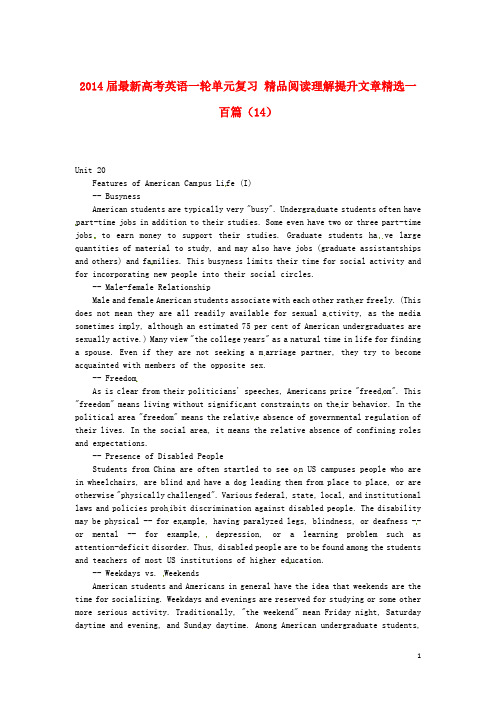
2014届最新高考英语一轮单元复习精品阅读理解提升文章精选一百篇(14)Unit 20Features of American Cam pus Li fe (I)-- BusynessAmerican students are typically very "busy". Undergra duate students often have part-time jobs in addition to their studies. Some even have two or three part-time jobs to earn money to support their studies. Graduate students ha ve large quantities of material to study, and may also have jobs (graduate assistantships and others) and fa milies. This busyness limits their time for social activity and for incorporating new people into their social circles.-- Male-female RelationshipMale and female American students associate with each other rath er freely. (This does not mean they are all readily available for sexual a ctivity, as the media sometimes imply, although an estimated 75 per cent of American undergraduates are sexually active.) Many view "the college years" as a natural time in life for finding a spouse. Even if they are not seeking a m arriage partner, they try to become acquainted with members of the opposite sex.-- FreedomAs is clear from their politicians' speeches, Americans prize "freed om". This "freedom" means living without signific ant constrain ts on the ir behavior. In the political area "freedom" means the relativ e absence of governmental regulation of their lives. In the social area, it means the relative absence of confining roles and expectations.-- Presence of Disabled PeopleStudents from China are often startled to see o n US campuses people who are in wheelchairs, are blind and have a dog leading them from place to place, or are otherwise "physically challenged". Various federal, state, local, and institutional laws and policies proh ibit discrimination against disabled people. The disability may be physical -- for ex ample, having paralyzed legs, blindness, or deafness -- or mental -- for example, depression, or a learning problem such as attention-deficit disorder. Thus, disabled people are to be found among the students and teachers of most US institutions of higher ed ucation.-- Weekdays vs. WeekendsAmerican students and Americans in general have the idea that weekends are the time for socializing. Weekdays and evenings are reserved for studying or some other more serious activity. Traditionally, "the weekend" mean Friday night, Saturday daytime and evening, and Sund ay daytime. Among American undergraduate students,though, "weekend" may now include Thursday night (and sometimes e ven Wednesday night as well). So they might go "out" for three consecutive nights -- Thursday, Friday, and Saturday. Graduate students in general have mo re responsibilities and presumably more maturity, so their socializing is more likel y to be limited to Friday nights and Saturdays.。
最新高考英语一轮单元复习 精品阅读理解提升文章精选一百篇(86)
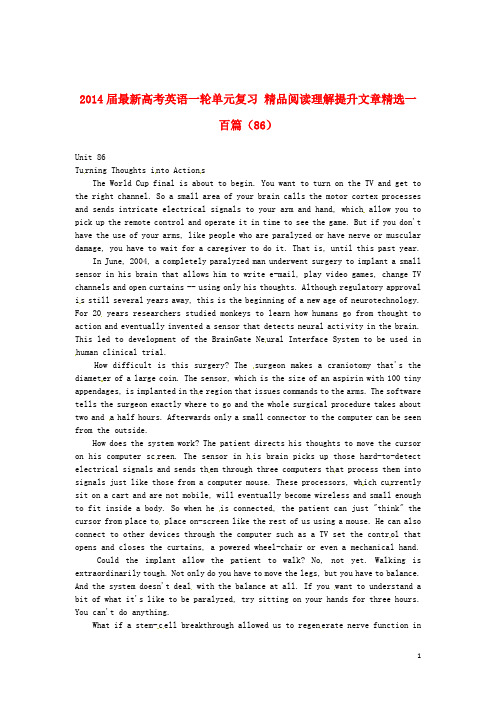
2014届最新高考英语一轮单元复习精品阅读理解提升文章精选一百篇(86)Unit 86Tu rning Thoughts i nto Action sThe World Cup final is about to begin. You want to turn on the TV and get to the right channel. So a small area of your brain calls the motor cortex processes and sends intricate electrical signals to your arm and hand, which allow you to pick up the remote control and operate it in time to see the game. But if you don't have the use of your arms, like people who are paralyzed or have nerve or muscular damage, you have to wait for a caregiver to do it. That is, until this past year.In June, 2004, a completely paralyzed man underwent surgery to implant a small sensor in his brain that allows him to write e-mail, play video games, change TV channels and open curtains -- using only his thoughts. Although regulatory approval i s still several years away, this is the beginning of a new age of neurotechnology. For 20 years researchers studied monkeys to learn how humans go from thought to action and eventually invented a sensor that detects neural acti vity in the brain. This led to development of the BrainGate Ne ural Interface System to be used in human clinical trial.How difficult is this surgery? The surgeon makes a craniotomy that's the diamet er of a large coin. The sensor, which is the size of an aspirin with 100 tiny appendages, is implanted in th e region that issues commands to the arms. The software tells the surgeon exactly where to go and the whole surgical procedure takes about two and a half hours. Afterwards only a small connector to the computer can be seen from the outside.How does the system work? The patient directs his thoughts to move the cursor on his computer sc reen. The sensor in h is brain picks up those hard-to-detect electrical signals and sends th em through three computers th at process them into signals just like those from a computer mouse. These processors, wh ich cu rrently sit on a cart and are not mobile, will eventually become wireless and small enough to fit inside a body. So when he is connected, the patient can just "think" the cursor from place to place on-screen like the rest of us using a mouse. He can also connect to other devices through the computer such as a TV set the contr ol that opens and closes the curtains, a powered wheel-chair or even a mechanical hand.Could the implant allow the patient to walk? No, not yet. Walking is extraordinarily tough. Not only do you have to move the legs, but you have to balance. And the system doesn't deal with the balance at all. If you want to understand a bit of what it's like to be paralyzed, try sitting on your hands for three hours. You can't do anything.What if a stem-c ell breakthrough allowed us to regen erate nerve function inspinal-cord-injury patients? Would that make the BrainGat e obsolete? Let's hope that happens! But if stem cells are able to regenerate the spinal cord, something will have to give instruction to those growing verve fibers on how to hook up. So maybe the device can be used to help instruct the nervous system in how to use the stem cells in a more efficient way.Could this technology be used to create super-heros, or super-villains? Technology in and of itself is neither good nor bad; it's how people apply it. Augmentation of function? Creating super-memory and super-motor abilities? Yes, researchers might come up with all kinds of applications that many people would be uncomfortable with. The ethical implications of these types of devices are worth discussing. But that can't stop this technology from helping people with disabilities.。
最新高考英语一轮单元复习 精品阅读理解提升文章精选一百篇(2)
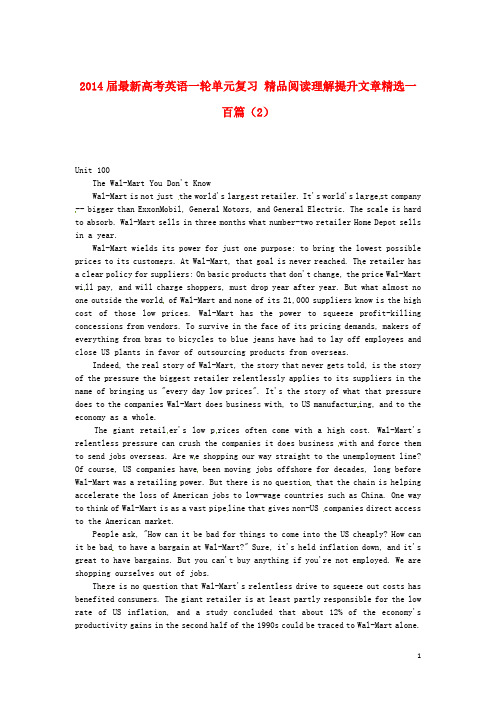
2014届最新高考英语一轮单元复习精品阅读理解提升文章精选一百篇(2)Unit 100The Wal-Mart You Don't KnowWal-Mart is not just the world's larg est retailer. It's world's la rge st company -- bigger than ExxonMobil, General Motors, and General Electric. The scale is hard to absorb. Wal-Mart sells in three months what number-two retailer Home Depot sells in a year.Wal-Mart wields its power for just one purpose: to bring the lowest possible prices to its customers. At Wal-Mart, that goal is never reached. The retailer has a clear policy for suppliers: On basic products that don't change, the price Wal-Mart wi ll pay, and will charge shoppers, must drop year after year. But what almost no one outside the world of Wal-Mart and none of its 21,000 suppliers know is the high cost of those low prices. Wal-Mart has the power to squeeze profit-killing concessions from vendors. To survive in the face of its pricing demands, makers of everything from bras to bicycles to blue jeans have had to lay off employees and close US plants in favor of outsourcing products from overseas.Indeed, the real story of Wal-Mart, the story that never gets told, is the story of the pressure the biggest retailer relentlessly applies to its suppliers in the name of bringing us "every day low prices". It's the story of what that pressure does to the companies Wal-Mart does business with, to US manufactur ing, and to the economy as a whole.The giant retail er's low p rices often come with a high cost. Wal-Mart's relentless pressure can crush the companies it does business with and force them to send jobs overseas. Are w e shopping our way straight to the unemployment line? Of course, US companies have been moving jobs offshore for decades, long before Wal-Mart was a retailing power. But there is no question that the chain is helping accelerate the loss of American jobs to low-wage countries such as China. One way to think of Wal-Mart is as a vast pipe line that gives non-US companies direct access to the American market.People ask, "How can it be bad for things to come into the US cheaply? How can it be bad to have a bargain at Wal-Mart?" Sure, it's held inflation down, and it's great to have bargains. But you can't buy anything if you're not employed. We are shopping ourselves out of jobs.The re is no question that Wal-Mart's relentless drive to squeeze out costs has benefited consumers. The giant retailer is at least partly responsible for the low rate of US inflation, and a study concluded that about 12% of the economy's productivity gains in the second half of the 1990s could be traced to Wal-Mart alone.By now, it is accepted w isdom that Wal-Mart makes the companies it does business with more efficient and focused, leaner and faster. Wal-M art itself is kn own f or continuo us improvement in its ability to handle, move, and track merchand ise. It expects the same of its suppli ers. But the ability to operate at peak efficiency only gets you in the door at Wal-Mart. Then the real demands start. Wal-Mart is legendary for forcing its suppliers to redesign ev erything from their packaging to their computer systems. It is also legendary for quite straightforwardly telling them what it will pay for their goods.。
最新高考英语一轮单元复习 精品阅读理解提升文章精选一百篇(6)
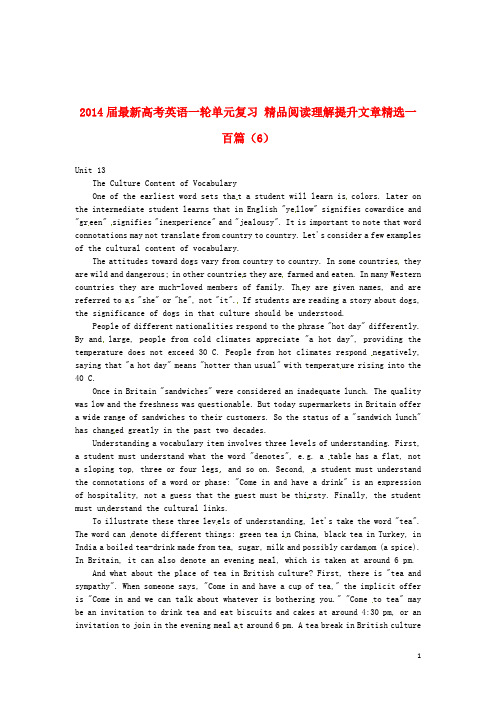
2014届最新高考英语一轮单元复习精品阅读理解提升文章精选一百篇(6)Unit 13The Culture Content of VocabularyOne of the earliest word sets tha t a student will learn is colors. Later on the intermediate student learns that in English "ye llow" signifies cowardice and "gr een" signifies "inexperience" and "jealousy". It is important to note that word connotations may not translate from country to country. Let's consider a few examples of the cultural content of vocabulary.The attitudes toward dogs vary from country to country. In some countries they are wild and dangerous; in other countries they are farmed and eaten. In many Western countries they are much-loved members of family. Th ey are given names, and are referred to a s "she" or "he", not "it". If students are reading a story about dogs, the significance of dogs in that culture should be understood.People of different nationalities respond to the phrase "hot day" differently. By and large, people from cold climates appreciate "a hot day", providing the temperature does not exceed 30 C. People from hot climates respond negatively, saying that "a hot day" means "hotter than usual" with temperat ure rising into the 40 C.Once in Britain "sandwiches" were considered an inadequate lunch. The quality was low and the freshness was questionable. But today supermarkets in Britain offer a wide range of sandwiches to their customers. So the status of a "sandwich lunch" has changed greatly in the past two decades.Understanding a vocabulary item involves three levels of understanding. First, a student must understand what the word "denotes", e.g. a table has a flat, not a sloping top, three or four legs, and so on. Second, a student must understand the connotations of a word or phase: "Come in and have a drink" is an expression of hospitality, not a guess that the guest must be thi rsty. Finally, the student must un derstand the cultural links.To illustrate these three lev els of understanding, let's take the word "tea". The word can denote di fferent things: green tea i n China, black tea in Turkey, in India a boiled tea-drink made from tea, sugar, milk and possibly cardam om (a spice). In Britain, it can also denote an evening meal, which is taken at around 6 pm.And what about the place of tea in British culture? First, there is "tea and sympathy". When someone says, "Come in and have a cup of tea," the implicit offer is "Come in and we can talk about whatever is bothering you." "Come to tea" may be an invitation to drink tea and eat biscuits and cakes at around 4:30 pm, or an invitation to join in the evening meal a t around 6 pm. A tea break in British cultureis a traditional break in the morning or afternoon when work may stop for a period of ten minutes.Thus it is difficult, if not impossible, to separate language from culture. Students need to look beyond the surface of the words and be aware of their cultural cont ent.。
最新高考英语一轮单元复习 精品阅读理解提升文章精选一百篇(15)
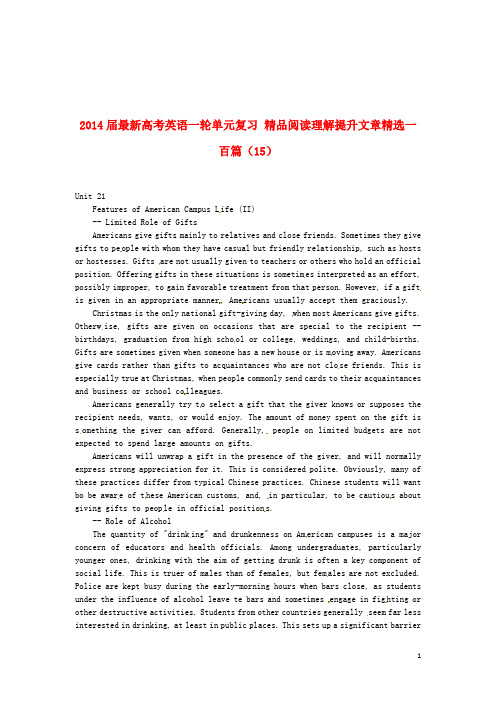
2014届最新高考英语一轮单元复习精品阅读理解提升文章精选一百篇(15)Unit 21Features of American Campus L ife (II)-- Limited Role of GiftsAmericans give gifts mainly to relatives and close friends. Sometimes they give gifts to pe ople with whom they have casual but friendly relationship, such as hosts or hostesses. Gifts are not usually given to teachers or others who hold an official position. Offering gifts in these situations is sometim es interpreted as an effort, possibly improper, to gain favorable treatment from that person. However, if a gift is given in an appropriate manner, Ame ricans usually accept them graciously.Christmas is the only national gift-giving day, when most Americans give gifts. Otherw ise, gifts are given on occasions that are special to the recipient -- birthdays, graduation from high scho ol or college, weddings, and child-births. Gifts are sometimes given when someone has a new house or is m oving away. Americans give cards rather than gifts to acquaintances who are not clo se friends. This is especially true at Christmas, when people commonly send cards to their acquaintances and business or school co lleagues.Americans generally try t o select a gift that the giver knows or supposes the recipient needs, wants, or would enjoy. The amount of money spent on the gift is s omething the giver can afford. Generally, people on limited budgets are not expected to spend large amounts on gifts.Americans will unwrap a gift in the presence of the giver, and will normally express strong appreciation for it. This is considered polite. Obviously, many of these practices differ from typical Chinese practices. Chinese students will want bo be awar e of t hese American customs, and, in particular, to be cautiou s about giving gifts to peop le in official position s.-- Role of AlcoholThe quantity of "drink ing" and drunkenness on Am erican campuses is a major concern of educators and health officials. Among undergraduates, particularly younger ones, drinking with the aim of getting drunk is often a key component of social life. This is truer of males than of females, but fem ales are not excluded. Police are kept busy during the early-morning hours when bars close, as students under the influence of alcohol leave te bars and sometimes engage in fig hting or other destructive activities. Students from other countries generally seem far less interested in drinking, at least in public places. This sets up a significant barrierto socializing between American and foreign students.-- StratificationWhenever a large group of people occupy a particular space over a period of time, they tend to associate more with those who resemble themselves. On an American campus, one can find evidence of groupings based on several points similarity, such as age, place of origin, gender, field of study, socio-economic status, reli gion, interests and race.。
最新高考英语一轮单元复习 精品阅读理解提升文章精选一百篇(16)
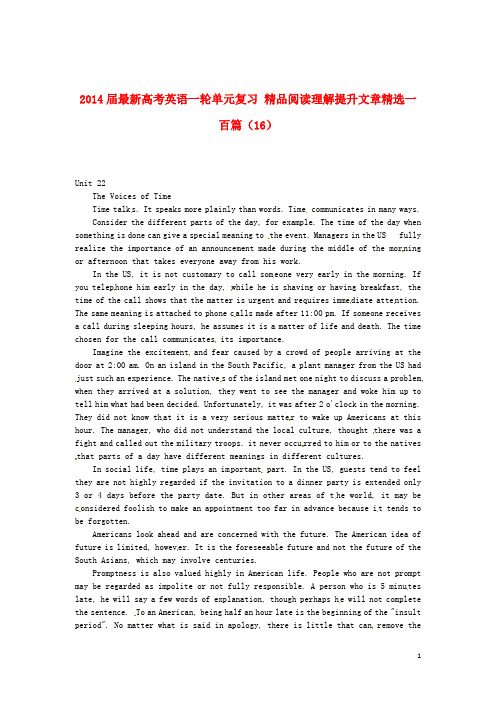
2014届最新高考英语一轮单元复习精品阅读理解提升文章精选一百篇(16)Unit 22The Voices of TimeTime talk s. It speaks more plainly than words. Time communicates in many ways.Consider the different parts of the day, for example. The time of the day when something is done can give a special meaning to the event. Managers in the US fully realize the importance of an announcement made during the middle of the mor ning or afternoon that takes everyone away from his work.In the US, it is not customary to call som eone very early in the morning. If you telep hone him early in the day, while he is shaving or having breakfast, the time of the call shows that the matter is urgent and requires imme diate atte ntion. The same meaning is attached to phone c alls made after 11:00 pm. If someone receives a call during sleeping hours, he assumes it is a matter of life and death. The time chosen for the call communicates its importance.Imagine the excitement and fear caused by a crowd of people arriving at the door at 2:00 am. On an island in the South Pacific, a plant manager from the US had just such an experience. The native s of the island met one night to discuss a problem, when they arrived at a solution, they went to see the manager and woke him up to tell him what had been decided. Unfortunately, it was after 2 o'clock in the morning. They did not know th at it is a very serious matte r to wake up Americans at this hour. The manager, who did not understand the local culture, thought there was a fight and called out the military troops. it never occu rred to him or to the natives that parts of a day have different meanings in different cultures.In social life, time plays an im portant part. In the US, guests tend to feel they are not highly regarded if the invitation to a dinner party is extended only3 or4 days before the party date. But in other areas of t he world, it may bec onsidered foolish to make an appointment too far in advance because i t tends to be forgotten.Americans look ahead and are concerned with the future. The American idea of future is limited, howev er. It is the foreseeable future and not the future of the South Asians, which may involve centuries.Promptness is also valued highly in American life. People who are not prompt may be regarded as impolite or not fully responsible. A person who is 5 minu tes late, he will say a few words of explanation, though perhaps h e will not complete the sentence. To an American, being half an hour late is the beginning of the "insult period". No matter what is said in apology, there is little that can remove thedamage done by a 30-minute wait.Since time has such different meanings in different cultures, communication is sometimes difficult. We will understand each other a little better if we keep this fact in m ind.。
最新高考英语一轮单元复习 精品阅读理解提升文章精选一百篇(7)
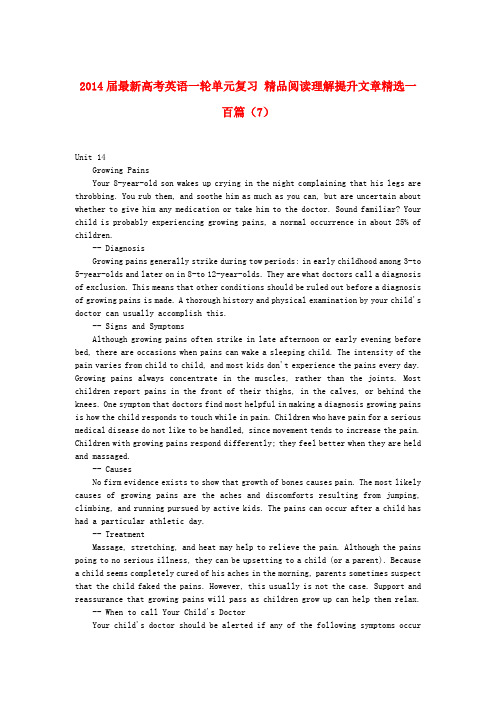
2014届最新高考英语一轮单元复习精品阅读理解提升文章精选一百篇(7)Unit 14Growing PainsYour 8-year-old son wakes up crying in the night complaining that his legs are throbbing. You rub them, and soothe him as much as you can, but are uncertain about whether to give him any medication or take him to the doctor. Sound familiar? Your child is probably experiencing growing pains, a normal occurrence in about 25% of children.-- DiagnosisGrowing pains generally strike during tow periods: in early childhood among 3-to 5-year-olds and later on in 8-to 12-year-olds. They are what doctors call a diagnosis of exclusion. This means that other conditions should be ruled out before a diagnosis of growing pains is made. A thorough history and physical examination by your child's doctor can usually accomplish this.-- Signs and SymptomsAlthough growing pains often strike in late afternoon or early evening before bed, there are occasions when pains can wake a sleeping child. The intensity of the pain varies from child to child, and most kids don't experience the pains every day. Growing pains always concentrate in the muscles, rather than the joints. Most children report pains in the front of their thighs, in the calves, or behind the knees. One symptom that doctors find most helpful in making a diagnosis growing pains is how the child responds to touch while in pain. Children who have pain for a serious medical disease do not like to be handled, since movement tends to increase the pain. Children with growing pains respond differently; they feel better when they are held and massaged.-- CausesNo firm evidence exists to show that growth of bones causes pain. The most likely causes of growing pains are the aches and discomforts resulting from jumping, climbing, and running pursued by active kids. The pains can occur after a child has had a particular athletic day.-- TreatmentMassage, stretching, and heat may help to relieve the pain. Although the pains poing to no serious illness, they can be upsetting to a child (or a parent). Because a child seems completely cured of his aches in the morning, parents sometimes suspect that the child faked the pains. However, this usually is not the case. Support and reassurance that growing pains will pass as children grow up can help them relax.-- When to call Your Child's DoctorYour child's doctor should be alerted if any of the following symptoms occurwith your child's pain: persistent pain, swelling, or redness in one particular area or joint; fever; limping; unusual rashes; loss of appetite; weakness; tiredness; or uncharacteristic behavior. These signs do not accompany growing pains and may be an indication of a medical problem that needs attention.。
最新高考英语一轮单元复习 精品阅读理解提升文章精选一百篇(50)
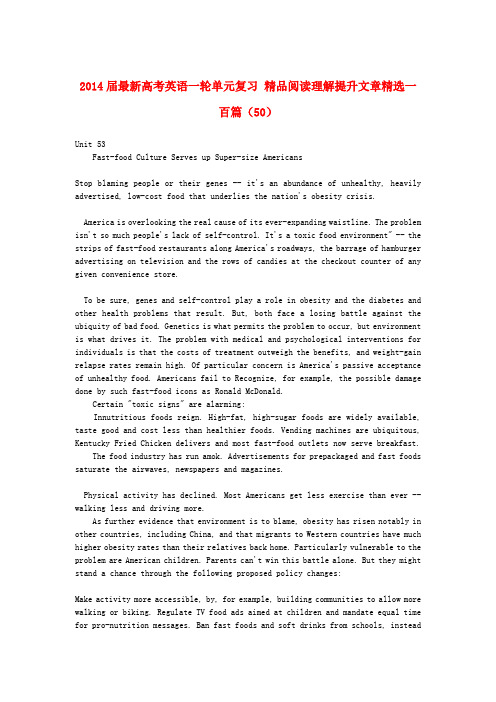
2014届最新高考英语一轮单元复习精品阅读理解提升文章精选一百篇(50)Unit 53Fast-food Culture Serves up Super-size AmericansStop blaming people or their genes -- it's an abundance of unhealthy, heavily advertised, low-cost food that underlies the nation's obesity crisis.America is overlooking the real cause of its ever-expanding waistline. The problem isn't so much people's lack of self-control. It's a toxic food environment" -- the strips of fast-food restaurants along America's roadways, the barrage of hamburger advertising on television and the rows of candies at the checkout counter of any given convenience store.To be sure, genes and self-control play a role in obesity and the diabetes and other health problems that result. But, both face a losing battle against the ubiquity of bad food. Genetics is what permits the problem to occur, but environment is what drives it. The problem with medical and psychological interventions for individuals is that the costs of treatment outweigh the benefits, and weight-gain relapse rates remain high. Of particular concern is America's passive acceptance of unhealthy food. Americans fail to Recognize, for example, the possible damage done by such fast-food icons as Ronald McDonald.Certain "toxic signs" are alarming:Innutritious foods reign. High-fat, high-sugar foods are widely available, taste good and cost less than healthier foods. Vending machines are ubiquitous, Kentucky Fried Chicken delivers and most fast-food outlets now serve breakfast.The food industry has run amok. Advertisements for prepackaged and fast foods saturate the airwaves, newspapers and magazines.Physical activity has declined. Most Americans get less exercise than ever -- walking less and driving more.As further evidence that environment is to blame, obesity has risen notably in other countries, including China, and that migrants to Western countries have much higher obesity rates than their relatives back home. Particularly vulnerable to the problem are American children. Parents can't win this battle alone. But they might stand a chance through the following proposed policy changes:Make activity more accessible, by, for example, building communities to allow more walking or biking. Regulate TV food ads aimed at children and mandate equal time for pro-nutrition messages. Ban fast foods and soft drinks from schools, insteadforging school contracts with sports-related companies. Subsidize healthy foods and drive down process of fruits and vegetables by 70 percent.Such measures would take the blame off people with obesity and are the only real path to doing something constructive about this problem.。
最新高考英语一轮单元复习 精品阅读理解提升文章精选一百篇(55)
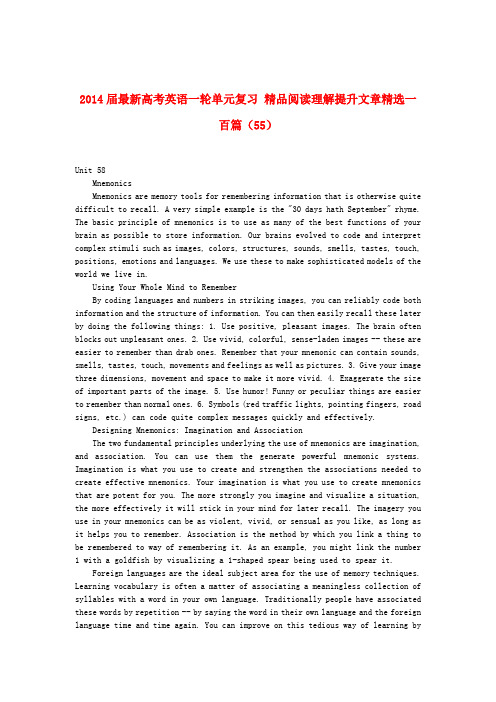
2014届最新高考英语一轮单元复习精品阅读理解提升文章精选一百篇(55)Unit 58MnemonicsMnemonics are memory tools for remembering information that is otherwise quite difficult to recall. A very simple example is the "30 days hath September" rhyme. The basic principle of mnemonics is to use as many of the best functions of your brain as possible to store information. Our brains evolved to code and interpret complex stimuli such as images, colors, structures, sounds, smells, tastes, touch, positions, emotions and languages. We use these to make sophisticated models of the world we live in.Using Your Whole Mind to RememberBy coding languages and numbers in striking images, you can reliably code both information and the structure of information. You can then easily recall these later by doing the following things: 1. Use positive, pleasant images. The brain often blocks out unpleasant ones. 2. Use vivid, colorful, sense-laden images -- these are easier to remember than drab ones. Remember that your mnemonic can contain sounds, smells, tastes, touch, movements and feelings as well as pictures. 3. Give your image three dimensions, movement and space to make it more vivid. 4. Exaggerate the size of important parts of the image. 5. Use humor! Funny or peculiar things are easier to remember than normal ones. 6. Symbols (red traffic lights, pointing fingers, road signs, etc.) can code quite complex messages quickly and effectively.Designing Mnemonics: Imagination and AssociationThe two fundamental principles underlying the use of mnemonics are imagination, and association. You can use them the generate powerful mnemonic systems. Imagination is what you use to create and strengthen the associations needed to create effective mnemonics. Your imagination is what you use to create mnemonics that are potent for you. The more strongly you imagine and visualize a situation, the more effectively it will stick in your mind for later recall. The imagery you use in your mnemonics can be as violent, vivid, or sensual as you like, as long as it helps you to remember. Association is the method by which you link a thing to be remembered to way of remembering it. As an example, you might link the number 1 with a goldfish by visualizing a 1-shaped spear being used to spear it.Foreign languages are the ideal subject area for the use of memory techniques. Learning vocabulary is often a matter of associating a meaningless collection of syllables with a word in your own language. Traditionally people have associated these words by repetition -- by saying the word in their own language and the foreign language time and time again. You can improve on this tedious way of learning byusing mnemonics. For instance, you may use images to link a word in your own language with a word in a foreign language. English: grumpy -- Chinese: LaoSaoManFuDe Image: a grumpy woman groaning with irritation.。
- 1、下载文档前请自行甄别文档内容的完整性,平台不提供额外的编辑、内容补充、找答案等附加服务。
- 2、"仅部分预览"的文档,不可在线预览部分如存在完整性等问题,可反馈申请退款(可完整预览的文档不适用该条件!)。
- 3、如文档侵犯您的权益,请联系客服反馈,我们会尽快为您处理(人工客服工作时间:9:00-18:30)。
2014届最新高考英语一轮单元复习精品阅读理解提升文章精选一
百篇(57)
Unit 6
Lost and Found
The week end was over, and Begbie had returned to town, re stless, and strangely unhappy. There was within him a curious sense of something lost. He unpacked his suitcase listlessly, compared its contents with the cata logue of his weekend needs. Everything was there, from hairbrush to dinner coat -- yet that sense of some thing left behind still oppressed him. A second time he went over th e list and compared it with his possessions, to find that nothing was missing; then on a sudden moment ther e fl ashed across his mind a full realization of what the lost object was. "That's it!" he said with a sigh of relief, "I'll write at once to my hostess and ask her to return it." Action followed the resolution, and, seating himself at his desk, Beg bie wrote:
My Dear Mrs. Shelton,
Upon my return from the never-to-be-forgotten series of golden hours at Sea Cliff, after the habit of the depa rting guest, I have left at least one of my possessions behind me. It is of value perhaps to nobody but myself, but poor as it is, I cannot very well do without it. It is my heart. If by some good chance you have found it, an d it is of no use to you, will you be good enough to return to me? Or, if by some good fortune you find it worth retaining, will you please tell me so, that I may know it is in your custody and is not lying somewhere cold and neglected? It is the only one I have, and it has never passed out of my keeping before.Harrison Begbie
The following morning, Begbie received a letter postmarked Sea Cliff, and addressed in the familiar handwriting of his hostess. Excitedly he tore it open and found the following:
My dear Mr. Beg bie,
What careless creatures you men are! I have found ten such articles as you described in my house during the past ten days, and out of so vast and varied a number I ca nnot quite decide which one is yours. Some of them are badly cracked; some are battered hopelessly, a nd only one of them is in first-class condition. I'm hoping it is yours, but I don't know. In any event on receipt of this won't you come down here at once and we can run over them together? I'll meet you on the arrival of the 12:15 at W avecrest station. Meanwhile, knowing how indispensable a part of the human mechanism a heart truly is, I send you mine to take the place of the other. You may keep it until your own is retur ned to you.
P.S. Telegraph me if you'll be on the 12:15 train.
Mary Shelton
Ten minutes later the following rush message sped over the wire:
Mrs. Shelton:
Haven't time to t elegraph you of arrival on 12:15. Am rushing to catch the 9:05. Harrison。
